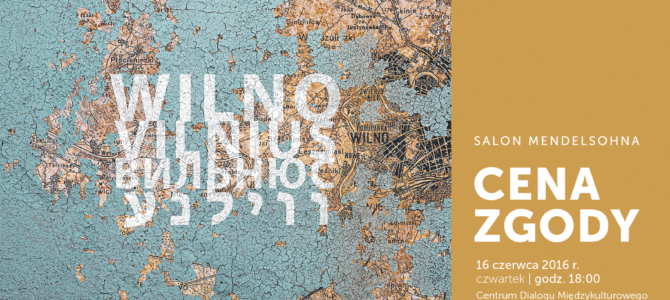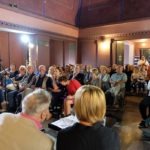
The Fundacja Borussia (Borussia Foundation) organized a meeting, book presentation and discussion with professor habil. Markas Petuchauskas called “Cena Zgody,” the Polish translation of the title of his book “Price of Concord,” in Olsztyn, Poland, June 16.
The foundation responsible for the book-launch is a cultural NGO well known in Poland and outside its borders and is now in its second decade of operation. The foundation encourages exchanges of information about ethnic cultures: science, learning, literature, art, theater and music. Four times per year the foundation holds meetings with remarkable cultural and scholastic figures from around the world. Vilnius receives special attention. Before Petuchauskas, Alyvdas Šlepikas, author of “Mano vardas – Marytė” [“My Name Is Marytė”] was the guest of honor at a similar event. Petuchauskas said he was surprised by the invitation and he got quite emotional about it since the meeting is so formal and intellectual. Those attending came from outside of Olsztyn as well, some from as far away as Warsaw. Dainius Junevičius, Lithuania’s first post-independence ambassador to Poland and now ambassador for special assignments, also attended.
Leaders of Olsztyn and the deputy mayor of the Voivod of Warmia and Mazury were also present. Petuchauskas was received by the overflow crowd as a famous Lithuanian theater historian and critic who has dedicated his many years of scholastic and creative work to transcultural dialogue and increasing concord between ethnic groups, especially Jews and Lithuanians. The professor said he was pleasantly surprised by the level of knowledge of the audience on Vilnius and pre-war Polish and Jewish scholars and artists. He was subjected to two hours of questions.
“Everyone knew about the pre-war Litvak writers Sutzkever and Kzczerginski, the artist Levicka and other famous artists who later established the Ghetto Theater. I’m not even talking about such world-famous creators from Vilnius such as the writer Romain Gary. As artists, beginning with Soutine, Lipschitz, Arbit Blat, and ending with contemporaries such as Samuel Bak. I felt as if I were speaking to an audience of historians. This is undoubtedly partly due to the long work of Fundacja Borussia, expanding the horizons of knowledge of the audience, spreading tolerance and respect for other ethnic groups and their culture,” Petuchauskas commented.
Event organizer and Borussia president Kornelia Kurowska gave a broad introduction to Petuchauskas’s work during Lithuanian independence and in the Soviet era, talking about his publications about then-notable Polish theater presentations in Lithuania. She also spoke separately about an article by Petuchauskas on Polish dramaturg Slawomiro Mrožek’s “Tango” and its performance on the Vilnius stage. The play was directed by Jonas Jurašas. Petuchauskas was the only one to devote a long article to it at that time. The professor donated copies of this and other articles about the Polish theater to the foundation. The audience took a keen interest in the discussion of Mrožek, a playwright who passed away three years ago now, and enjoying great popularity in Poland currently.
Organizers and audience members said they were looking forward eagerly to the appearance of Price of Concord in Polish translation.
The meeting at the Mendelsohn Salon in Olsztyn brought up some old connections as well. World-famous Jewish German architect Erich Mendelsohn, then a student at Berlin University, donated to his native Olsztyn Jewish community architectural plans for a tahara building. A tahara is a small building at a Jewish cemetery in which the corpse is cleansed. Many years later the Borussia Foundation reconstructed the building, calling it the Mendelsohn Salon, where the meeting with Petuchauskas was held. In Petuchauskas’s native city of Šiauliai, Lithuania, Mendelsohn designed the Semion Volpert house, a private venereal disease clinic and the family home. When he was 5 and 6, Petuchauskas and his mother and father, then the deputy mayor of Šiauliai, used to visit their friends Semion and Raisa Volpert at their home. “As Volpert told me,” Petuchauskas recalled, “Mendelsohn visited them in Šiauliai. I can still see as if it were today Raisa’s impressive grand piano. It loomed in the spacious and very comfortable Volpert pantry with the colorful winter garden of exotic plants the Volperts tended. In summer, when the veranda doors were opened, you’d find yourself in the yard where the Volperts maintained a different ‘Lithuanian’ arboretum. And in the Soviet era my mother and I used to stop and stay there on trips from Vilnius, and the Volperts used to stay with us in Vilnius,” Petuchauskas recalled.
“And this is where there is something mystical: eighty years later I find myself in a home designed by Mendelsohn. This time in Olsztyn,” Petuchauskas commented.
The home now houses the Šiauliai Jewish Community. It is Mendelsohn’s only building in Lithuania.
by Ilona Rūkienė
Snapshots from the meeting: Borussia president Kurowska, first from left; professor habil. Petuchauskas, second from left; Lithuanian Foreign Ministry representative ambassador Junevičius, third.





